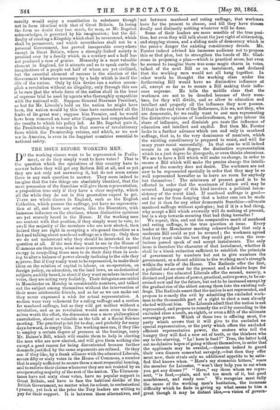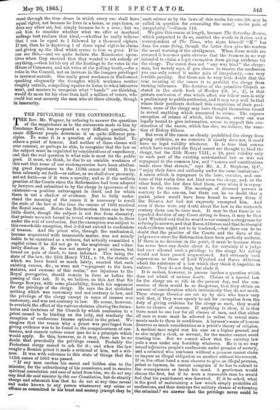THE ISSUE BEFORE WORKING MEN.
DO the working classes want to be represented in Parlia- ment, or do they simply want to have votes ? That is the question which the operatives of this country have to answer before they will get any Reform Bill at all, and as yet they are not only not answering it, but do not seem aware there is any such question to answer. They seem indeed to imagine that the two things are absolutely identical, that the mere possession of the franchise will give them representation, a proposition true only if they have a clear majority, which all the while they do not in this generation expect to get. There are whole classes in England, such as the English Catholics, which possess the suffrage, yet have no representa- tion at all, and there are others, like the Dissenters, with immense influence on the elections, whose distinctive opinions are yet scarcely heard in the House. If the working men are content with that position, if they simply want to vote, to swell the majority of the members who are now elected, then indeed they are right in accepting a six-pound franchise as a fact and talking about manhood suffrage as a theory. Only then we do not understand why they should be interested in the question at all. If the men they want to see in the House of Commons are there now, what more is necessary ?—better spend energy in compelling those men to do their duty than in seek- ing to alter a balance of power already inclining to the side they approve. But if they really want to be represented, to make their ideas on the relation of capital to labour, on co-operation, on foreign policy, on education, on the land laws, on ecclesiastical subjects, audibly heard, in short if they want members instead of votes, they are acting very foolishly. Their delegates assembled in Manchester on Monday in considerable numbers, and talked out the subject among themselves without the intervention of their more aristocratic friends, and as far as we can make out they never expressed a wish for actual representation. A section were very vehement for a rating suffrage and a section for manhood suffrage, but as they will get neither without a revolution, and as no revolution would seem even to them- selves worth the effort, the discussion was a mere philosophical exercitation, about as valuable as the talk at a Social Science meeting. The practical point for to-day, and probably for many days forward, is simply this. The working men can, if they like to employ a certain degree of pressure at the hustings, carry Mr. Baines's Bill, which will enable them to help in electing the men who are now elected, and will give them nothing else except a good reason for being discontented because further demands justified by the same arguments are refused. Or they can if they like, by a frank alliance with the educated Liberals, secure fifty or sixty votes in the House of Commons, a number that is amply sufficient to secure them a most respectful hearing, and to enforce their claims whenever they are not resisted by an overpowering majority of the rest of the nation. The Ultramon- tanes have not sixty clear votes, have no popular support in Great Britain, and have to facie the habitual dislike of the British Government, no matter what its colour, to ecclesiastical tyranny, yet look at the price the Tory leaders are willing to pay for their support. It is between these alternatives, and
not between manhood and rating suffrage, that workmea have for the present to choose, and till they have chosen finally and distinctly nothing whatever will be done.
Some of their leaders are more sensible of the true posi- tion, but even they will talk about the just right of citizenship, and stepping-stones, and a sliding scale of-democracy which is the preci,e danger the existing constituency dreads. Mr. Forster indeed advised his immense audience not to propose this or that plan, but to strengthen the hands of Mr. Glad- stone in proposing a plan—which is practical sense, but even, he seemed to imagine there was some magic charm in votes, talked of the next Bill as an instalment, and declared that the working men would not all hang together. In other words he thought the working class under the forthcoming Bill would have no distinctive influence at all, except so far as to secure a Bill making their influ- ence supreme. He tells the middle class that the workmen are not to be dreaded because of tbeir num- bers, for they will divide, and so allow to education and intellect and property all the influence they now possess. If that is the real view of the Reformers, it is we, not they, who are democratic, for we really want to seat men representing the distinctive opinions of handicraftsmen, to give labour its of influence, and diminish pro tents the influence of education and intellect and capital. But then Mr. Forster- looks to a further advance which can end only in manhood suffrage, that is, to the very dominance of numbers, which the existing constituency is prepared to resist, and will for- many years resist successfully. In that case he will indeed secure in an unjust degree the distinctive representation which in a just degree he disregards, or even thinks obnoxious. We are to have a Bill which will make no change, in order to secure a Bill which will make the precise change the intelli- gence of the country does not desire. The workmen are not now to be represented specially in order that they may be so well represented hereafter as to leave no room for 'anybody but themselves ! The minimum of present good is to be- effected in order that the maximum of future evil may be secured. Language of this kind involves a political incon- sistency of the worst kind. If manhood suffrage is good— and we are far from denying that a better case can be made out for it than for any other democratic franchise—advocate- manhood suffrage without apologies ; but if it is a bad- thing, why accept a Bill which avowedly will do nothing at present, but is a step towards securing that bad thing hereafter ?
We repeat, this, and not the comparative merit of manhood and rating suffrage, is the true question at issue. Every leader at the Manchester meeting acknowledged that only a moderate Bill could as yet be secured ; the workmen agreed that they must take the best they could get ; even the reso- lutions passed speak of and accept instalments. The only issue is therefore the character of that instalment, whether it- shall be a blank reduction sufficient to establish the principle of government by numbers but not to give numbers the government, or a direct addition to the working men's strength within the walls of the House. The Radicals offer the first, a political vol-au-vent for the present and a delusive hope for the future; the educated Liberals offer the second, namely, a distinct and just share of power, practical, active power, to be ex- ercised now and for the future, but not to be increased except by the gradual rise of the ablest among them into the existing suf- frage. The Radicals assert that the nation is not represented, and propose to remedy the evil by admitting the excluded work- man to the thousandth part of a right to elect a man already elected without him. The Liberals admit that the nation is not represented, and propose to remedy the evil by conceding to the excluded class a tenth, an eighth, or even a fifth of the ultimate sovereign power. Which of those two is offering most, the party which avows that it will give to the excluded no special representation, or the party which offers the excluded efficient representative power, the orators who tell the hungry they will find a new set of teeth, or the thinkers who say to the starving, "Le! here is food?" True, the latter hold. out no delusive hopes of going without themselves, in order that the applicants may be overfed,—threaten indeed to guard their own dinners somewhat savagely,—bat then they offer meat now, their rivals only an additional appetite to be satis- fied God knows when. "Here's my stomaohic bitters," roars the member for Leicester, "won't they help you to eat when you get any dinner ?" "Here," say those whom we repre- sent, "is food,—plain, and not too much of it, but good nourishment, and ready now." We recognize most fully the cause of the working man's hesitation, the immense difficulty which he finds in giving up what seems to him a great though it may be distant idea,—a vision of govern- ment through the true demos in which every one shall have equal rights, not because he lives in a house, or pays taxes, or does any other act, but simply because he is a man ; but we ask him to consider whether what we offer or manhood suffrage best realizes that ideal,—whether he really believes that 1 can be equal to 1 followed by a thousand ciphers. If not, then he is depriving 1 of those equal rights he claims and giving up the ideal which seems to him so great. If he can see this,—and we quite believe the Manchester opera- tives when they shouted that they wanted to rob nobody of anything,—then let his cry at the hustings be for votes in the House of Commons, and not votes at the polling booth,—for a voice in the Council, not an increase in the tongues privileged to murmur outside. One really great workman in Parliament speaking eloquently the thoughts which workmen mutter roughly outside, compelling squires to listen to what labourers want, and masters to recognize what " hands " are thinking, would do more for his class than half a million of voters, who could but seat securely the men who sit there already, though in insecurity.































 Previous page
Previous page